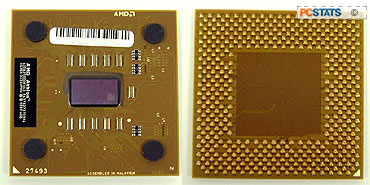AMD AthlonXP 2500+ Barton Processor Review
The AMD
AthlonXP processor has long represented an equal balance of pure economical
value and performance. These traits have been enticing consumers towards AMD
since the introduction of DDR memory, and that has given the company a strong
foothold in the
consumer PC markets. While it used to be said Intel was a force to be
reckoned with, it now seems as though AMD has become just that, leaving Intel more on the
defensive than ever before. While the price of an AMD processor is not as inexpensive as it once was ($200 CDN for a flagship
processor anyone?), it still packs in one heck of a punch!
With the release of the
recent 'Barton' core AMD have undeniably rejuvenated the AthlonXP processor lineup once again. And since this
isn't exactly breaking news, I'm sure you are already aware that the extra cache
this core contains has brought about even better performance results...
The AMD AthlonXP 2500+ is easily the gem
in the AthlonXP lineup, as it has arguably the most ideal price/performance
ratio of any
processor on the market right now. For enthusiasts, the AthlonXP 2500+ holds significance
not simply because it is the lowest priced processor based on the Barton core, but also because it holds the
promise of significant performance boosts when run at over stock
speeds.
AMD built the AthlonXP 2500+ based on the 0.13
micron process, and so the core has a total transistor count of 54.3
million. This, up from the 37.6 million transistors found on the highly successful Thoroughbred
core. The extra transistors make up the extra 256KB of L2 cache that has been added
to Barton, which otherwise is architecturally similar to Thoroughbred.
The
default clock speed of the AthlonXp 2500+ processor is 1.83 GHz, and the processor
runs on a voltage of 1.65V.

As you can see, AMD use a
standard organic FC-PGA package for the AthlonXP 2500+. The layout of the processor is the
same as previous Barton based CPU's, however you can now clearly see the
processor traces on the packaging. You'd better take a bit more care in handing
your processor as breaking one of those lines would render your processor
useless.
With a retail price of just $130 CDN ($100 US) the AthlonXP
2500+ is an absolute steal for the performance you get out of it. That's why we
bought a couple recently for the PCStats Labs. If you're interested in learning a bit
more on the Barton core please read our AthlonXP 3000+ processor review
.
Word processing and other 2D applications do
not require a lot of raw MHz but they do benefit greatly from the addition
L2 cache which makes them the perfect for data crunching. Now, what about
overclocking?

